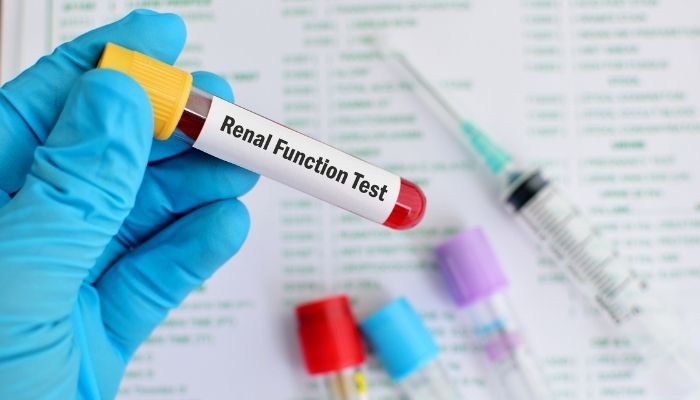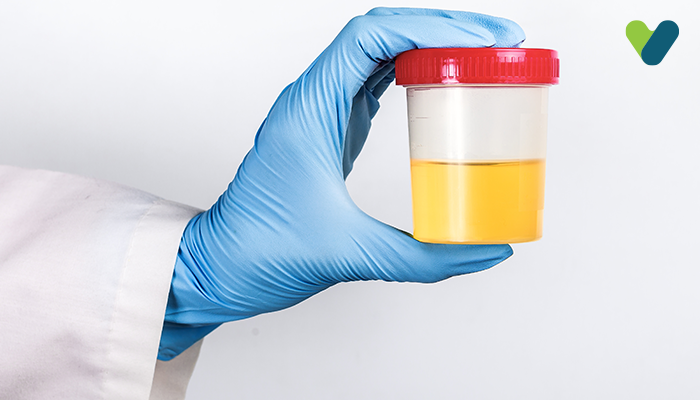Renal function test (RFT test) or kidney function test is a group of tests that are usually performed to evaluate the conditions of your kidney (renal) function. The test offers various levels of different substances, including several minerals, electrolytes, proteins, and glucose (sugar), in the blood to check the present health status of your kidneys.
Your kidneys play a pivotal role in extirpating wastes from your body. If kidneys can’t function properly, then waste products start getting accumulated in your body and may damage your body. Various diseases and conditions are responsible for kidney damage. So, the prime objective of this RFT test is to weigh the conditions of your kidney.
Test Summary of Renal Function Test
| Is Also known as | Renal Function Test, Kidney Function Test |
| Test Type | Blood/urine or both |
| Renal function test includes | BUN, Estimated GFR, Serum Creatinine, Microalbuminuria, Urinalysis |
| Preparation | No specific requirements |
| Reporting | Within 24 hrs |
| RFT Blood Test price | The cost of this test may vary from city to city and from lab to lab |
| Also included in | Health Insurance Plans |
| Related tests | Liver Function Test, C-Reactive Protein (CRP), Blood Sugar Test, CBC, Ultrasound, CT Scan, Kidney Biopsy |
What Is the RFT Blood Test Full Form?
RFT test means Renal Function Test. A renal function test means a test to evaluate how well your kidneys are performing.Why Is RFT Test Done
Certain health conditions like high blood pressure or diabetes affect the functions of your kidneys. If you are suffering from any of the conditions, your doctor will recommend a renal profile test to monitor these health conditions.
You may also need a renal function test if you have symptoms that portray your kidney problems. Some of these symptoms are:
- Hematuria or Blood in your urine
- Dysuria or Painful urination
- Frequent need to urinate
- Problems with starting to pee
What Is Renal Function Test?
A renal function test evaluates the condition of your kidneys. An RTF Test includes1. Urinalysis
A urinalysis indicates the presence of protein and blood in the urine. Protein may be present in your urine due to several reasons. Infections and physical workouts enhance urine protein. Your doctor will ask you to provide a 24-hour urine collection sample. By analyzing the sample, your doctor will tell how fast creatinine (a waste product) is clearing from your body.2. Serum Creatinine Test
This test checks whether creatinine is accumulating in your blood or not. The kidneys usually filter creatinine from the blood. A high level of creatinine indicates some kidney problems.3. Blood Urea Nitrogen (BUN)
This test scrutinizes waste products in your blood. BUN tests measure the amount of nitrogen in the blood. Urea nitrogen is a breakdown product of protein.An increased level of BNU may not indicate kidney damage at all times. Some medications, including large doses of aspirin and some types of antibiotics, may enhance your BUN. Inform your doctor if you are taking any medications before performing the test.
4. Estimated GFR
This test evaluates how well your kidneys are filtering waste. The test determines the rate by looking at some factors- Test results, specifically creatinine levels
- Age
- Gender
- Race
- Height
- Weight
RFT Test Normal Range
1. Creatinine
A creatinine level higher than 1.2 milligrams/deciliter (mg/dL) for women and 1.4 mg/dL for men is a sign of a kidney problem2. BUN
A normal BUN level is between 7 and 20 mg/dL. A higher value could suggest several different health problems.3. Estimated GFR
Any result lower than 60 milliliters/minute/1.73m2 may be a worrying sign of kidney disease. These are the renal function test's normal values. Abnormal test results indicate that you have some kidney problems and you should consult a doctor for the proper line of treatment.RFT Test Procedure
What happens during a RFT urine test?Your test provider will give you a container for a 24-hour urine test. On the day of the test:
- Urinate in the washroom when the first wake up
- You need urinate into the container for the remaining day
- On day two, urinate into the container when you first wake up
RFT Blood Test Procedure
For a kidney blood test, you need to visit a laboratory to give your blood sample. By inserting a needle, a technician will collect a blood sample and will give it for analysis. To get most estimated result people go for glomerular filtration rate (GFR) and proteinuria (albuminuria).According to the Kidney Disease Improving Global Outcomes (KDIGO). The phases of chronic kidney disease (CKD) are as follows,
Glomerular Filtration Rate (GFR)
- GFR more than 90 ml/min/1.73 m2 in stage 1
- GFR between 60 and 89 ml/min/1.73 m2 in stage 2
- GFR 45 to 59 ml/min/1.73 m2 Stage 3a
- GFR 30 to 44 ml/min/1.73 m2 Stage 3b
- GFR of 15 to 29 ml/min/1.73 m2 in stage 4
- GFR less than 15 ml/min/1.73 m2 in stage 5 (Last-stage of renal disease)
RFT Blood Test Normal Range
Serum creatinine levels in women range from 0.6 to 1.1 mg/dL, whereas men's levels range from 0.7 to 1.3 mg/dL.
In healthy adults, the glomerular filter rate (GFR) should be between 140 mL/min and 1.73m2. It is normal to have a blood pressure of more than 90.
The ratio of albumin (mcg/L) to creatinine (mg/L) should be less than 30 mg/g. When the kidneys are working properly, the albumin to creatinine ratio (ACR) is usually low.
Blood urea nitrogen (BUN) levels in adults and children should be between 7 and 20 mg/dL. These figures differ from one laboratory to the next.
A urinalysis checks for protein and blood in the urine to rule out albuminuria and other conditions. The average amount of protein in urine is 150 mg per day.
Also Read : Are You Worried About Your Creatinine Levels?
What happens at the high level of KFT ?
Kidney dysfunction is indicated by a creatinine level greater than 1.2 mg/dL in women and 1.4 mg/dL in men. Severe renal illness, muscular disease, diabetes, dehydration, heart difficulties, hyperactive thyroid glands, and other conditions are associated with high creatinine levels. A rise in serum creatinine can be identified when renal function declines by 50%.
BUN levels rise as renal function declines. Kidney injury is indicated by a level greater than 20 mg/dL. Dehydration, urinary tract obstruction, congestive heart failure, and other conditions can all cause high BUN levels. When there are burn injuries, BUN levels rise as well.
Also Read : Worst Foods To Avoid With Kidney DiseaseReferences:
- Markers of renal function tests. North American Journal of Medical Sciences [Internet][PDF].
- Renal Function Test (RFT). Physiopedia [Internet].
- Renal Function Testing. American Journal of Kidney Diseases [Internet].


